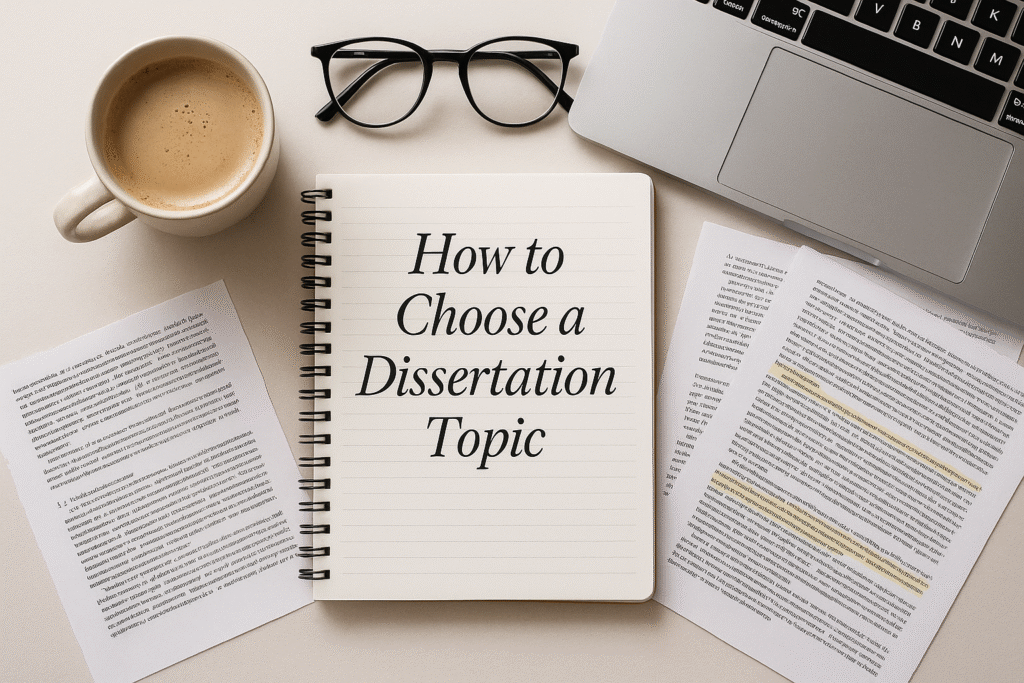Research Proposal Writing Services for Master’s, MPhil & PhD Students – Qundeel.com
How to Choose a Dissertation Topic: Tips, Ideas, and Expert Guidance for Students
Estimated reading time: 8 minutes, 22 secondsHow to Choose a Dissertation Topic

Choosing a dissertation topic is a pivotal step in your academic journey. It can shape not only your immediate research experience but also your future career and professional trajectory. While the process can feel daunting, it is also an exciting opportunity to explore your interests, engage with current research, and make a meaningful contribution to your field of study. A well-chosen dissertation topic can lead to a highly rewarding research experience, provide valuable expertise, and even open doors to future academic and professional opportunities.
This guide will assist you to go through the entire process of selecting your dissertation topic. It provides useful hints, tricks, and information on how to make the right and bold decisions. You may be a graduate, postgraduate or doctoral student, whichever level this guide is designed to help you in finding a topic that interests you, challenges and inspires you. Let us begin this process of finding a dissertation topic that fits exactly with what you are passionate and interested in as well as what your career goals are.
Why Dissertation Topic Selection Matters
The choice of dissertation topic is really important. The decision you make determines the course that you will pursue in your research, affects your performance in education and may even affect employment opportunities after school. A carefully picked subject matter could bring your high level of expertise in a particular field, make a valuable contribution in the field and make you a professional of credibility and worth.
Alternatively, adoption of a vaguely or broadly stated topic may result into serious difficulties. This could be in form of time wasted, spent time and efforts in trying to find relevant pieces of information and stress. Major factors to consider in order to have a productive dissertation process are as follows:
- Align your topic with your academic interests and personal passions.
- Ensure originality and relevance to your field.
- Evaluate available resources, data, and research feasibility.
The focus on such aspects will enable you to produce a voluminous and compelling dissertation and help build a solid basis of subsequent academic and professional activities.
Step 1: Identify Your Interests and Passions
Self reflection is the initial step to choosing a dissertation topic. Reflect on what truly makes you excited in the field since passion is pivotal to perseverance a key to the successful dissertation completion.
The first place you should start is the list of your academic interests. Consider classes, lectures or projects that you found interesting. What were the topics that were of interest or instigated questions? Such considerations can be a good indicator of possible themes that were worth mentioning.
It is also significant to match your personal interests with future professional plans. A subject that crosses your interests and career goals can prove to be very fulfilling making it more motivating and enriches your career path.
Remember, a dissertation represents a significant time commitment. To maintain long-term engagement, strike a balance between personal interest and academic feasibility. Some useful starting points for brainstorming include:
- Favorite subjects or coursework
- Unresolved questions from previous assignments
- Real-world problems that resonate with you
Starting with these themes sets a solid foundation for developing a meaningful research topic.
Step 2: Explore Current Research and Literature
After identifying your interests, immerse yourself in existing research. Examining current literature is critical in understanding what has already been studied and where gaps remain.
Start by checking on the new articles in the well recognized journals. Find out new patterns, discussions and spheres to be investigated. This will assist in generating new dissertation ideas and will keep in mind that your research will be adding something positive.
Use such academic databases as JSTOR, PubMed, or Google Scholar. Develop lists of relevant works, their methodology, and findings to get the landscape of the research set in perspective. Also, the participation in academic conferences, webinars, or seminars gives access to the latest study and social connections with other professionals in your discipline.
A concise approach to literature exploration includes:
- Identifying key journals in your field
- Reviewing both recent and seminal papers
- Engaging in conferences for fresh perspectives
By thoroughly examining existing research, you gain valuable context and insight, guiding you toward a well-informed dissertation topic.
Step 3: Brainstorm and Shortlist Dissertation Ideas
With a foundation in literature, it’s time to brainstorm potential dissertation topics. Jot down any idea that sparks interest initially, quantity matters more than feasibility.
After having compiled a list, discuss the ideas critically. Take into consideration alignment, to your field, personal interest, and available resources. Drop the too-large topics and those both too narrow and irrelevant to your research goals.
Carefully choose subjects on which original work can be created and contribute to. Question yourself how every idea can contribute to existing knowledge. This aspect of refinement will assist you in developing a short list of topics that are the most promising and sensible ones.
To structure your brainstorming:
- List all potential topics
- Assess each for relevance and personal interest
- Narrow down to a manageable shortlist
Having a curated list simplifies the decision-making process, ensuring you select a topic you are both passionate about and capable of researching deeply.
Step 4: Evaluate Feasibility and Scope
Once you have a shortlist, evaluate each topic’s feasibility. Consider available resources, access to data, and time constraints. A realistic topic ensures that your research can be completed effectively and efficiently.
Essay the scope. You should also avoid either being too broad or too narrow in the topics you choose to write about since it might be too much or too little. Make sure that you have access to sufficient resources in order to conduct extensive research. The major concern of creating a successful dissertation is the feasibility of the study.
Consider the following when evaluating feasibility and scope:
- Resource availability
- Data accessibility
- Time and budget constraints
This assessment helps create a practical framework for your research, ensuring a focused and manageable dissertation project.
Step 5: Seek Guidance and Feedback
Consulting mentors, advisors, and experienced academics can be invaluable. They can provide insights, identify potential challenges, and suggest methodologies or perspectives you might not have considered.
Peer feedback is also essential. Fellow students can offer alternative viewpoints, practical tips, and support that refine your ideas. Engaging in open discussions helps enhance your dissertation topic.
Key steps for seeking guidance include:
- Discuss ideas with academic advisors
- Share your shortlist with peers for constructive feedback
- Remain open to suggestions and adapt ideas as needed
This step ensures a well-rounded perspective and helps establish a strong foundation for your dissertation.
Step 6: Align with Career Goals and Academic Requirements
Long term career goals should be supported by a dissertation. Select a subject that could be of interest to your professional standing and in a field that you want to pursue. A strategic topic may be used as a launching pad to future opportunities.
Simultaneously, be sure to discuss a topic that fits your institutionary stipulation and guidelines in its scholastic demands. Compliance to these standards is helpful in terms of easy approval, look more professional and ready.
Factors to ensure alignment include:
- Identifying career paths related to your topic
- Reviewing institutional guidelines
- Confirming the topic supports personal and professional goals
This alignment enhances the relevance and impact of your dissertation, making it both academically and professionally valuable.
Step 7: Consider Originality, Impact, and Ethics
Originality is crucial. Aim for a topic that offers fresh insights, whether through a new perspective, underexplored area, or innovative approach.
Consider the potential impact of your research. Ask yourself how your findings could influence academia, industry, or society. Research with tangible impact often contributes to meaningful change and recognition.
Ethics cannot be overlooked. Ensure your research methods comply with ethical standards to avoid issues that could invalidate your work.
Keep these in mind:
- Originality: What makes your topic unique?
- Impact: How will your research contribute to your field?
- Ethics: Are your methods responsible and compliant?
Balancing these considerations ensures a thoughtful, impactful, and credible dissertation.
Step 8: Finalize and Refine Your Research Proposal Topic
Finally, refine your chosen topic into a clear, concise, and actionable research statement. It should be specific enough to guide your research while allowing flexibility for exploration.
Refinement is iterative. As you draft your proposal, you may discover areas that require focus or expansion. Be prepared to adjust your research question or hypothesis accordingly.
Checklist for finalizing your topic:
- Clearly define your research question or hypothesis
- Ensure alignment with current trends in your field
- Verify adherence to ethical standards
- Prepare a well-rounded proposal reflecting careful planning
A refined topic sets a solid foundation for a successful dissertation, providing clarity and direction for your research.
Common Mistakes in Dissertation Topic Selection (and How to Avoid Them)
Many students make mistakes when selecting a dissertation topic, which can lead to challenges later. Common errors include:
- Choosing a topic that is too broad or too narrow
- Selecting a topic without sufficient data or resources
- Neglecting to consult advisors regularly
Avoid these pitfalls by carefully evaluating your topic, ensuring resource availability, and seeking consistent guidance. This approach will help you choose a viable, meaningful, and rewarding dissertation topic.
Useful Tools and Resources for Dissertation Topic Selection

Using the right tools and resources streamlines the topic selection process. Academic databases and research platforms are invaluable for exploring literature and identifying gaps.
Key resources include:
- Google Scholar: For academic papers and trending research topics
- JSTOR: Access to scholarly articles and journals
- Mind mapping software: Tools like MindMeister assist in brainstorming ideas
Leveraging these tools ensures a smoother, well-informed journey toward selecting your dissertation topic.
Conclusion: Moving Forward with Confidence
Choosing a dissertation topic is a defining moment in your academic journey. By taking a strategic, informed approach, you can select a topic that aligns with your interests, meets academic requirements, and supports your career goals.
Remember, this is an iterative process requiring flexibility, reflection, and persistence. With careful planning, guidance, and a focus on originality and impact, you can confidently embark on your dissertation journey and produce meaningful, rewarding research.
